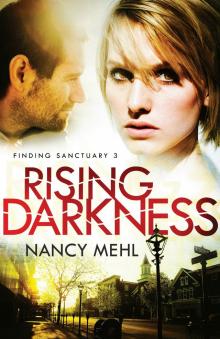- Home
- Nancy Mehl
Unforeseeable
Unforeseeable Read online
© 2013 by Nancy Mehl
Published by Bethany House Publishers
11400 Hampshire Avenue South
Bloomington, Minnesota 55438
www.bethanyhouse.com
Bethany House Publishers is a division of
Baker Publishing Group, Grand Rapids, Michigan
www.bakerpublishinggroup.com
Ebook edition created 2013
All rights reserved. No part of this publication may be reproduced, stored in a retrieval system, or transmitted in any form or by any means—for example, electronic, photocopy, recording—without the prior written permission of the publisher. The only exception is brief quotations in printed reviews.
Library of Congress Cataloging-in-Publication Data is on file at the Library of Congress, Washington, DC.
ISBN 978-1-4412-6271-4
Scripture references are from the King James Bible unless otherwise indicated.
This is a work of fiction. Names, characters, incidents, and dialogues are products of the author’s imagination and are not to be construed as real. Any resemblance to actual events or persons, living or dead, is entirely coincidental.
Cover design by Paul Higdon
Cover photography by Mike Habermann Photography, LLC
Author represented by Benrey Literary, LLC
To my beloved daughter-in-law, Shaen
A wife of noble character who can find? She is worth far more than rubies. Her husband has full confidence in her and lacks nothing of value. She brings him good, not harm, all the days of her life.
Proverbs 31:10–12 NIV
This was my prayer. You were my answer.
Contents
Cover
Title Page
Copyright Page
Dedication
Chapter 1
Chapter 2
Chapter 3
Chapter 4
Chapter 5
Chapter 6
Chapter 7
Chapter 8
Chapter 9
Chapter 10
Chapter 11
Chapter 12
Chapter 13
Chapter 14
Chapter 15
Chapter 16
Chapter 17
Chapter 18
Chapter 19
Chapter 20
Chapter 21
Chapter 22
Chapter 23
Acknowledgments
About the Author
Books by Nancy Mehl
Back Ad
Back Cover
Chapter / 1
“Murder and meat loaf just don’t go together,” Lizzie grumbled. “Why did the elders agree to let the new sheriff come here? To my restaurant? No one asked my permission.”
“It’s absurd to think a serial killer could possibly be hiding out in Kingdom,” I replied. “I don’t see why the sheriff needs to bother us with this.”
Lizzie chopped a large onion with a little too much gusto. “Well, your fiancé is the one who suggested it, Callie. Maybe you need to ask him what’s behind it.”
I set a tray of dirty dishes on the counter and sighed. “Levi says they’re bringing Sheriff Timmons here after his meeting with the elders so they can properly introduce him. After that, he plans to speak to us.” After washing my hands, I leaned against the sink and frowned at Lizzie. “Levi says the sheriff feels it’s important to warn us about these . . . murders.”
“‘Levi says. Levi says.’” Lizzie shook her head. “You’re so funny. I can’t remember the last time I saw anyone so much in love.”
I pointed my finger at her. “Besides you and Noah, you mean?”
A quick smile flitted across her face and then disappeared. “After everything this town has been through, to be honest, the idea of more bad news . . .”
“I know. I feel the same way. Why can’t the sheriff meet with just the elders and let them decide what to tell us?”
Lizzie sighed. “Women have been killed, Callie. I guess the sheriff is trying to warn us. To keep us safe.” She plopped the onions into a big pot of chili sitting on the stove and pushed a lock of curly black hair out of her eyes. “I still wish they’d picked someplace besides my restaurant. Murder doesn’t really stimulate the appetite, does it?”
Lizzie had worked hard to make Cora’s Corner Café a spot where families felt comfortable. It had taken Cora Menlo, the original owner, a long time to get Kingdom’s Mennonite citizens to accept the restaurant. When she’d opened it, over fifteen years ago, most families were convinced meals should be served at home. But over time, Cora’s Café had been received by a majority of our citizens. In fact, it had become a popular meeting place for friends to gather and socialize. I was grateful to work there and even more thankful that Lizzie and I had become good friends. During the past several years, I hadn’t had much time for socializing. Papa’s illness took up almost all of my time. Since he passed four months ago, I really leaned on my relationship with Lizzie.
“I think Levi chose the restaurant because the topic is . . . well, not one easily discussed in church,” I said. “This is the only other place in town big enough to accommodate a crowd.”
Lizzie grunted. “He’s right, I guess. But I still don’t have to like it.”
“Levi would never do anything to hurt you, Lizzie.”
“I know that. I’m not upset with him. Frankly, I’m still trying to get used to Levi’s being our pastor. It feels so strange, Pastor Mendenhall’s leaving and Levi being elected to take his place. I used to love to tease him, but now it feels . . . I don’t know, sacrilegious or something.”
Even though our conversation was a serious one, I couldn’t hold back a giggle. “Try being engaged to marry your pastor. That’s really confusing.”
Lizzie frowned at me. “Does it bother him that a few folks in the church think he’s too young for the position?”
I shrugged. “He acts like it doesn’t, but you know Levi. It’s hard to know what he’s really thinking.”
Lizzie nodded. “I don’t like the way he’s changed in the last few months. I mean, he’s always had a serious side, but we were always able to tease him out of it. Lately he’s been different. Almost glum. I’m worried about him.”
“I don’t think he’s unhappy. He just wants to do a good job.”
“Well, he’s a little too somber for me. Since accepting the pastorate, he doesn’t laugh much. Or joke with Noah the way he used to.”
I knew exactly what Lizzie was talking about, but for some reason her words made me feel defensive. Levi should be happy because of our engagement, but what Lizzie said was true. Day by day he seemed to grow more solemn.
“I wish people would leave him alone and let him do his job,” I said tersely. “Why does everyone have to have an opinion about everything? No wonder he’s changed.”
Lizzie grunted. “This is Kingdom, Callie. Folks think poking their nose into other people’s business is their right. Their responsibility. It’s always been that way. Hopefully, the uneasiness about Levi will fade away after a while.”
“I guess there were already some concerns because we had three younger elders on the board.”
“The blame for that should be directed toward the older elders who quit. My father, John Lapp, and Elmer Wittenbauer.” She shook her head. “Seems ridiculous to worry about good men like Levi, Noah, and Ebbie Miller when the church voted for someone like Elmer Wittenbauer. He’s old, but that sure didn’t make him the right choice.”
I nodded my agreement. Elmer Wittenbauer, who’d stepped down over a dispute with Pastor Mendenhall, didn’t have a good reputation in Kingdom. When he was first elected, no one knew about all the problems in his home. But after he began serving as an elder, his laziness toward his family an
d the mistreatment of his wife and daughter slowly became common knowledge. Before Pastor Mendenhall and the other elders were faced with having him removed, he’d quit, citing health reasons. At least the church had learned an important lesson about being more careful in selecting men for positions of authority.
Lizzie grabbed a large spoon and began stirring the chili. “Levi’s one of the wisest men I’ve ever known. Even if he is only thirty.” She stopped and turned toward me. “What about you? Do you ever worry about your age? Twenty-two is pretty young for a pastor’s wife.”
“I try not to think about it too much, but I do pray I won’t let him down.”
Even though I tried to sound undaunted, I was very concerned about my age and lack of experience. How could I possibly live up to the job? Besides taking care of a husband, a home, and any future children, I was expected to visit those in our church who were sick, as well as coordinate assistance to families who needed help with food, clothing, and other needs. Along with those duties, several of the women had asked that the ladies’ Bible study begin again. It had disbanded after Bethany, Pastor Mendenhall’s wife, left town. The idea terrified me. I’d spent a lot of time reading the Bible, but as a new bride, how in the world was I supposed to teach married women in the church about being godly wives? It was ridiculous.
I wanted to confess my fears to Lizzie, but I was afraid. Afraid that she’d see me for the fraud I really was. For the failure I felt like. I’d been in love with Levi for a long time, but I’d never considered that one day he might become the pastor of Kingdom Mennonite Church. Now I had no choice but to try to find a way to live up to the role of a pastor’s wife. If I couldn’t, I risked losing the only man I wanted to spend the rest of my life with.
“Oh, Callie,” Lizzie said. “You’ll be wonderful. We all loved Bethany, but this last year she was so restless and unhappy that she didn’t do much for the church. You don’t have a tough act to follow. Everything will work out.”
“I hope you’re right. I think everyone’s in shock because of Pastor and his family moving away.”
“Bethany was convinced that living here was keeping them from fulfilling the Lord’s admonition to ‘Go ye into all the world, and preach the gospel to every creature.’ Then when Pastor was almost killed in the church fire last summer, she put her foot down and insisted they leave. It was hard to argue with her when she truly believed it was wrong for them to stay.”
“Do you think she was right?”
Lizzie shrugged. “I have no idea. All I know is that I miss them. Of course, I’m thrilled to have Levi as our pastor,” she added quickly, “but Pastor Mendenhall was such a blessing to this town. He tried so hard to move us toward grace and away from judgment.”
I knew exactly what she meant, but some church members, including Lizzie’s father and John Lapp, seemed to believe that Pastor Mendenhall’s stand for grace had led to his downfall. No amount of reasoning would sway them or their companions. In the past year, Matthew Engel’s attitudes had softened in many ways, especially toward his daughter, Lizzie, and granddaughter, Charity, but his views about keeping the leaven of the world out of Kingdom remained strong—much to Lizzie’s dismay. And John, who had recently lost his wife to cancer, stood with Matthew every step of the way.
“Well, I pray the Mendenhalls are happy in Nebraska,” I said, “and I hope Levi will be given the chance to fill pastor’s shoes without undue pressure.”
Lizzie sighed deeply. “The whole church should support him. He was brave enough to accept the position.”
“I hope so too. It would hurt Levi to think his appointment might bring strife.” I straightened my apron and adjusted my prayer covering. As usual, several curls had escaped my bun. No matter how hard I tried to attain the sleek look most of the women in Kingdom achieved, my stubborn hair refused to stay in place. I finally gave up.
“I hate that you and Levi had to push back your wedding date,” Lizzie said.
I sighed. “I understand why it was necessary, but I hope we don’t have to wait much longer. We’ve been engaged for three months now and moved the wedding twice.”
“What’s the new date?”
“We haven’t picked a date, but we’re planning for March. Levi feels things should be going more smoothly by then.”
Lizzie grunted. “Two more months. I know you’re getting impatient.”
“I’m trying not to be, but it’s hard.”
She nodded and turned her attention back to her chili.
I grabbed two clean coffee carafes and carried them over to one of the new electric coffee makers Lizzie had purchased for the restaurant. Now, instead of trying to brew coffee on the stove in large tin coffeepots, we just filled these huge metal containers with water and coffee grounds, flipped a switch, and let them sizzle and pop until the red lights came on, telling us the coffee was brewed and ready to drink. At first the chrome monsters intimidated me, but now I found the convenience wonderful—even though I still felt a little guilty about using electricity.
As I prepared to fill the carafes, I noticed that the red light was lit on only one of the coffee makers. Putting my hand against the other one, I was dismayed to find it was still cold. I checked the plug and jiggled it, but nothing happened.
“This pot’s not working,” I told Lizzie.
“Oh, Callie,” she said, “I forgot to tell you about that receptacle. It’s not functioning. You’ll have to move the pot over here.” She pointed to an empty receptacle near the dishwasher. “Bud Gruber will be back tomorrow to fix it.”
I unplugged the heavy container and carried it to the spot Lizzie indicated. “But he was just here this morning,” I said. “Why didn’t he fix it then?”
“He needed some part he didn’t have with him.” She shook her head. “He’s been working really hard to put in our additional receptacles and help us switch over from our generator to electricity. I feel guilty allowing him to give us so much of his time for the pittance he charges.”
“Isn’t he the same man who helped Cora get the restaurant up and running when it first opened?”
Lizzie nodded. “Yes. And don’t think he didn’t catch some flak from the elders back then.”
“I’m surprised he was willing to help us again.”
“Well, Cora said he was the only one she trusted to get everything up and running. I felt bad about calling him so soon after his wife died, but according to Cora, having something to do is just what he needs.”
I laughed. “You certainly have been filling that requirement. He’s starting to become a fixture around here.”
The addition of electricity to our town was met with joy by some residents and with suspicion by others. At first, those wanting service had to ask for approval from the elders. Some of our downtown businesses received permission, along with a lot of our farmers. But after a while, spurred on by Levi and most of our younger elders, the church lifted its ban. Everyone had to decide for themselves if electricity was something they really needed. Interestingly enough, most folks concluded they liked life the way it was and didn’t want to alter their plain existence. Most of us lived in Kingdom because we loved simplicity, so change wasn’t always looked upon as progress. A few people, like Matthew, were convinced that the addition of “evil” things like electricity would ruin the soul of our town. In truth, there wasn’t much of a difference.
“Well, this coffee maker is full,” I said. “The other one should be ready in plenty of time. I’ll make the rounds again, but to be honest, most folks aren’t ordering much. Except pie, of course. I’m glad you made extra.”
Lizzie shrugged. “It’s two o’clock. People in Kingdom like to eat their meals at the proper time. They won’t start ordering supper until at least five or five-thirty.”
I grinned. “But pie is acceptable anytime?”
She laughed. “You’ve got that right.”
I headed out into the crowded dining room. The usual cheery atmosphere was noticeably subd
ued. I loved the restaurant with its gleaming oak floors, chrome tables, and wooden booths. Oak paneling halfway up the walls turned into red-and-white-checked wallpaper, although not much of the wallpaper was actually visible. Quilts, painted plates, and a few rare pictures from the early days of Kingdom covered almost every available space. A hearty fire crackled in the large brick fireplace, adding an additional impression of coziness. Usually I felt safe and secure inside the inviting room, but today there was a chill that even a roaring fire couldn’t quench. Death hung in the air, and though I tried to ignore uneasy feelings of dread, they refused to be banished.
After warming up everyone’s coffee and refilling a few water glasses, I took orders for five more pieces of Lizzie’s Dutch apple pie. I’d just delivered the last one when I noticed three buggies pull up in front of the restaurant, one right after the other. Behind them, a Washington County sheriff’s car drove up slowly and parked a few spots away. I watched as the new sheriff got out. The sudden silence in the dining room was an indication I wasn’t the only person interested in what was happening outside.
I almost gasped when I got a clear look at the sheriff. He looked young. Really young. As he and the elders entered the restaurant, it got so quiet I could almost hear people breathing. The men paused to wipe snow off their shoes and boots. We had almost three inches on the ground, and it had started snowing again early this morning. It was still coming down outside, and I wondered when we’d get a break. I loved the snow, but it made life harder on those who relied solely on a horse and buggy to get around.
I hurried to the kitchen to let Lizzie know the elders and the sheriff had arrived. She followed me back to the dining room. As we entered, Levi had just begun to address the crowd. His eyes sought mine, and he gave me a shy smile. I felt a sudden deep rush of emotion. Levi looked a lot like his younger brother Noah, but was a little taller. In the summer his brown hair became streaked with blond. In winter, however, his hair darkened and was almost exactly the same shade as Noah’s. Even though the brothers were similar in appearance, they were very different in personality. Noah was gregarious and friendly, but Levi was more quiet and introspective. Levi had a deep and abiding faith and loved to encourage people to put their trust in God, no matter what the circumstance. Sometimes he would chide me for not trusting enough. I had to admit that my faith needed encouragement. Caring for my father had weakened me physically, emotionally, and spiritually. Levi firmly believed that God would meet every need, answer every prayer, and touch every broken place. In truth, his support and prayers lifted my spirits, and his love gave me hope for the future. Something I’d misplaced during Papa’s illness.

 Night Fall
Night Fall Blind Betrayal
Blind Betrayal Gathering Shadows
Gathering Shadows Fatal Frost
Fatal Frost Fire Storm
Fire Storm Dead End
Dead End Unforeseeable
Unforeseeable Rising Darkness
Rising Darkness Unbreakable
Unbreakable Simple Secrets (The Harmony Series 1)
Simple Secrets (The Harmony Series 1) Inescapable
Inescapable Simple Deceit (The Harmony Series 2)
Simple Deceit (The Harmony Series 2) Inescapable (Road to Kingdom Book #1)
Inescapable (Road to Kingdom Book #1) Simple Choices
Simple Choices